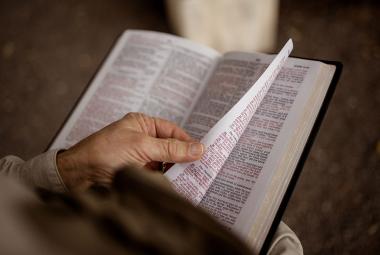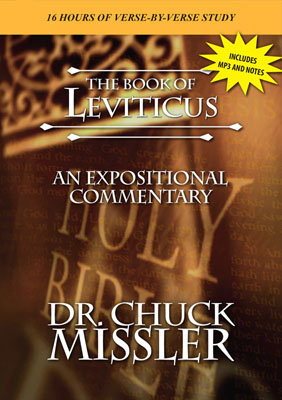It may come as a surprise to discover that there are a number of Biblical experts who regard the Book of Leviticus as the most important book of the Bible! (Dr. Samuel H. Kellogg, Dr. Albert C. Dudley, J. Vernon McGee, et al.)
The Most Important Thing?
What is The Most Important Thing in the world? Holiness! True happiness begins with holiness.1
“If I had my choice of all the blessings I can conceive of I would choose perfect conformity to the Lord Jesus, or, in one word, holiness.”
- Charles Spurgeon
Holiness isn’t a luxury: it’s a necessity. It’s not limited to “the Jews in ancient Israel”: Leviticus instructs New Testament Christians how to appreciate holiness and appropriate it into their everyday lives. We seem to want Jesus to solve our problems and carry our burdens, but we don’t want Him to control our lives and change our character.
But as he which hath called you is holy, so be ye holy in all manner of conversation; Because it is written, Be ye holy; for I am holy.2
1 Peter 1:15, 16
What is “holiness”? It is the primary emphasis in the Bible. This word occurs 87 times in Leviticus alone. The Hebrew word for “holy” used in Leviticus, qodesh, means “that which is set apart and marked off; that which is different; separateness; apartness; sacredness.” The English word “holy” comes from the Old English word halig, which means “to be whole, to be healthy.” The related word “sanctify” comes from the Latin sanctis, which means “consecrated, sacred, blameless.”
Anything that God said was holy had to be treated differently from the common things of life. The Sabbath was holy because God set it apart for His people.3 The priests were holy because they were set apart to minister to the Lord.4 Their garments were holy and could not be duplicated for common use.5 The tithe is holy.6
Holiness Revealed
How did a Holy God reveal Himself and His holiness? The pagan religions were notoriously immoral and involved occultic idols, temple prostitution, and the like. God commanded His people to stay away from their altars and shrines and to refuse to learn their ways. You never call any of the heathen deities “holy.” But the “Holy One of Israel” is one of the most oft-repeated names of YHWH in Scripture (30X in Isaiah alone). In both declaration and demonstration, YHWH made it clear to the people of Israel that He is a holy God, righteous in all His works and just in all His judgments. He also gave them a Holy Law that contained both promises and penalties, of which the Ten Commandments are the essence.7 It taught them right from wrong, defined things both clean and unclean, and declared the penalties of disobedience. There was no “value relativism” here! The requirements of holiness are uncompromising. Near misses don’t count. “The wages of sin is death,”8 and “the soul that sinneth, it shall die.”9
God's Predicament
God hates sin, but He loves sinners. And because He loves sinners and wants to forgive them, He provided a substitute to die in the sinner’s place. The whole sacrificial system declared to Israel that a substitutionary death would be required to die in the sinner’s place. All this was a prefiguring of a promised Savior who would lay down His life for the sins of the world. What is the “Gospel”? It is God’s proclamation of a plan of mercy to sinners. The very definition of the “Gospel” is built on these very specifications:
That Christ died for our sins according to the Scriptures; And that he was buried, and that he rose again the third day according to the scriptures
1 Corinthians 15:3, 4
The death of Jesus Christ was not a tragedy; it was an achievement. He didn’t just die: He fulfilled the myriads of precise specifications detailed in the Scriptures that pointed toward this most significant event in the universe.
Relevance of This Book to Us Today
Leviticus is the definitive revelation of the character of God. And God has not changed. It is the revelation of the fundamental conditions of true religion. These spiritual truths still abide: there is for sinful man no citizenship in the kingdom of God apart from a High Priest and Mediator with a propitiatory sacrifice for sin. Beyond the self-offering of the worshiper of God stands the constant testimony that it is only through the shedding of blood - not his own - that man can have remission of sin. We can’t appreciate Christ as the solution until we understand the requirements which had to be met.
The Epistle to the Hebrews lays down the principles upon which we are to interpret Leviticus. The typical character of the ordinances is affirmed that the Tabernacle was an “example and shadow of the heavenly things”;10 the sacrifices prefigured “better sacrifices than these,” even the one offering of Him who “put away sin by the sacrifice of Himself”;11 and, that the holy times and sabbatic seasons of the law were “a shadow of things to come.”12
Still More to Come
We have seen the “type” of the day of atonement fulfilled in the entering into heaven of our great High Priest, but in the type He came out again to bless the people. Has that been fulfilled? Has He yet proclaimed absolution of sin to guilty Israel? How about the Feast of Trumpets and that of the ingathering at full harvest? How about that consummate type of all, the year of Jubilee? Leviticus looks forward to a glorious future yet to come, with the requirements of holiness fully met in Him.
The Book of Leviticus cannot be “read”; it has to be studied. But fasten your seat belts. It’s going to be an exciting and highly privileged excursion!







